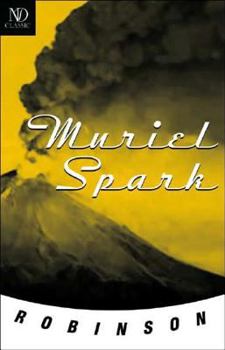Robinson
Select Format
Select Condition 
Book Overview
January Marlow, a heroine with a Catholic outlook of the most unsentimental stripe, is one of three survivors out of twenty-nine souls when her plane crashes, blazing, on Robinson's island. Presumed dead for months, the three survivors must wait for the annual return of the pomegranate boat. Robinson, a determined loner, proves a fair if misanthropic host to his uninvited guests; he encourages January to keep a journal: as "an occupation for my mind,...
Format:Paperback
Language:English
ISBN:0811215180
ISBN13:9780811215183
Release Date:February 2003
Publisher:New Directions Publishing Corporation
Length:176 Pages
Weight:0.45 lbs.
Dimensions:0.5" x 5.2" x 8.1"
Customer Reviews
2 ratings
Muriel Spark, Robinson
Published by Thriftbooks.com User , 18 years ago
I sometimes find it ironic that Defoe's Robinson Crusoe (1719) is generally identified as the beginning of realism in English literature. While Crusoe does, arguably, bookend a tradition of novelistic prose defined by a rational approach to observation, description, and narration of events, it also spawned a tradition of desert-island stories that demonstrate, again and again, how the isolated individual's ability to represent what is "real" strains the devices of realism to the point that they inevitably shudder and break down. From the inexplicable single footprint that sends Defoe's Crusoe into an existential crisis, to the bizarre supernatual whispers of the island on ABC's Lost, the shipwrecked narrator is one of western culture's most durable reminders of how, sometimes, the most realistic way we have of telling it like it is plunges quickly into the downright surreal. Muriel Spark's second novel, Robinson (1958), is an exemplary part of this tradition. More conventionally realist in style than her other novels, its familiar novelistic lexicon, passages of descriptive detail, and explicit invocation of the iconic Crusoe tale lull one into a sense of readerly security--that trust, so vital to realism, that one knows from the words on the page just what is going on around here. Spark's narrator, January, relies on her own powers of observation and rational deduction to make sense of her surroundings and situation, and we in turn rely on her; by the time she, and we too, realize that "the real" behaves differently on an island--or, rather, for the solitary individual mind, untempered by social negotiation--eluding the formula of empirical evidence and rational judgment, more is at stake than we bargained for: for January, her very life; for us, our ability to believe that she, our only guide, is the best conduit of her own story. While those readers expecting a book full of Spark's signature piquancy might be disappointed (which is not to say it's not there; for example, one of January's wreck-mates speaks a "peculiar idiom of English speech ... acquired first from a Swiss uncle, using Shakespeare and some seventeenth-century poets as textbooks, and Fowler's Modern English Usage as a guide," and his dialogue is consistently hilarious), Robinson seems to me an excellent instance of a non-realist's foray into realism, illuminating the genre's frequently forgotten--even disavowed--quirks and mysteries.
Like Icarus Ascending
Published by Thriftbooks.com User , 21 years ago
Like The Takeover (1976), A Far Cry From Kensington (1988), and Symposium (1990), Robinson (1958) is an intelligent, closely - observed, and highly enjoyable Muriel Spark novel which has failed to find a broad loyal audience or gain the kind of sterling reputation that most of her other books enjoy. The ruminative Robinson is distinct among her novels for a number of reasons, not the least of which is its resemblance to the traditional realistic novel. Robinson is not written in the high satiric style for which Spark is most admired, nor is it an overtly experimental novel like The Driver's Seat (1970) or Not To Disturb (1971). In terms of literary style, the title Robinson most resembles in Spark's oeuvre is A Far Cry From Kensington, another first - person narrative featuring a realistically - drawn female protagonist with few illusions about the perfections of her own character. Taking its cue from Daniel Defoe's famous island adventure, Robinson tells the story of January Marlow, the lone female survivor of a plane crash on a small volcanic island near the Azores in the Atlantic Ocean. The island's mysterious, controlling, and cultured owner, Robinson, lives there alone in seclusion with only a small boy, who is not his son, for companionship. Young Jimmie Waterford, Robinson's second cousin and heir, and Tom Wells, a coarse, middle - aged shyster, are the only other survivors. Forced into one another's shaken and injured company until the annual return of a pomegranate boat, the four adults warily go about making the best of their situation. They find themselves competing for influence over Miguel, Robinson's undersocialized "child disciple," while acknowledgements and accusations of homosexuality and bisexuality fly between the men. The vigilant January, attempting to grasp the hidden emotions and motivations of the others, imitates their facial expressions and modes of speech when she believes no one is watching, hoping to intuit clues. During nightly evening gatherings that are clearly a strain for all, Robinson interprets the island's history in terms of both the Atlantis myth and the Avalon of King Arthur. Caught between the zealous Catholic conservatism of Robinson and the apparent credulous superstition of Tom Wells, who travels with and sells Druidic gnome pendants, January, remembering the beliefs of her Scottish grandmother, has to resist the impulse to bow in worship at the sight of the rising moon. Robinson persistently suggests that January keep a daily journal, and her hesitant friendship with Jimmie begins to take on romantic shadings. Beneath the veneer of civility and cooperation that Robinson subtly enforces, the tension, ambivalence, and dislike among the four gradually increases, until a strange violence erupts and the survivors are forced to arm themselves against one another. Like Memento Mori (1958), The Prime of Miss Jean Brodie (1961), and The Hothouse By The East River (1973) among others, Robinson's narrative revo






